人教版高中英语必修第一册Unit4 Natural disasters SectionⅠ Listening speaking and talking课件
文档属性
| 名称 | 人教版高中英语必修第一册Unit4 Natural disasters SectionⅠ Listening speaking and talking课件 | 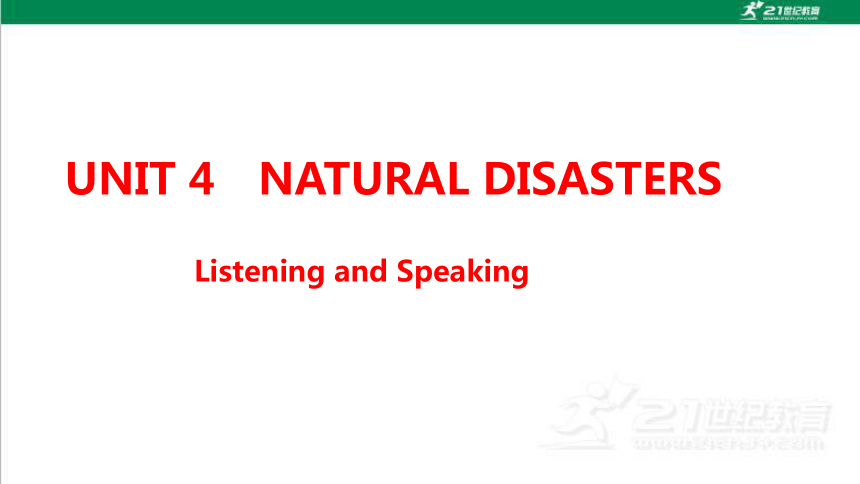 | |
| 格式 | ppt | ||
| 文件大小 | 2.0MB | ||
| 资源类型 | 试卷 | ||
| 版本资源 | 人教版(2019) | ||
| 科目 | 英语 | ||
| 更新时间 | 2025-07-16 15:34:15 | ||
图片预览

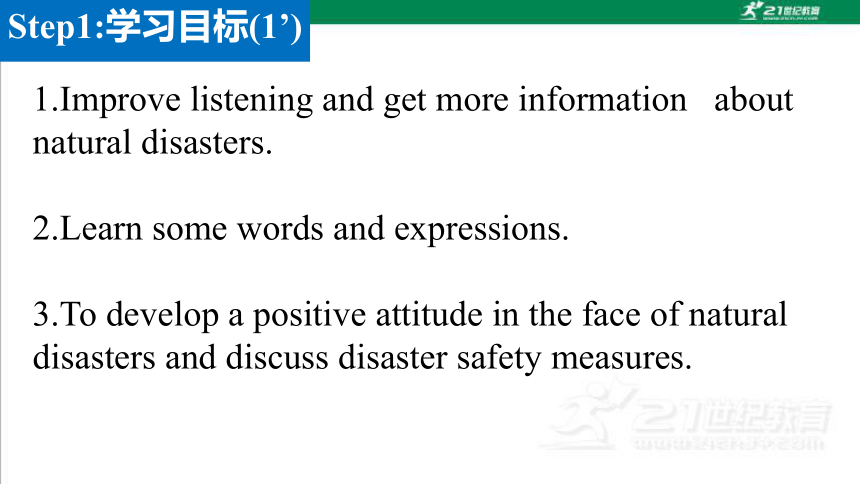
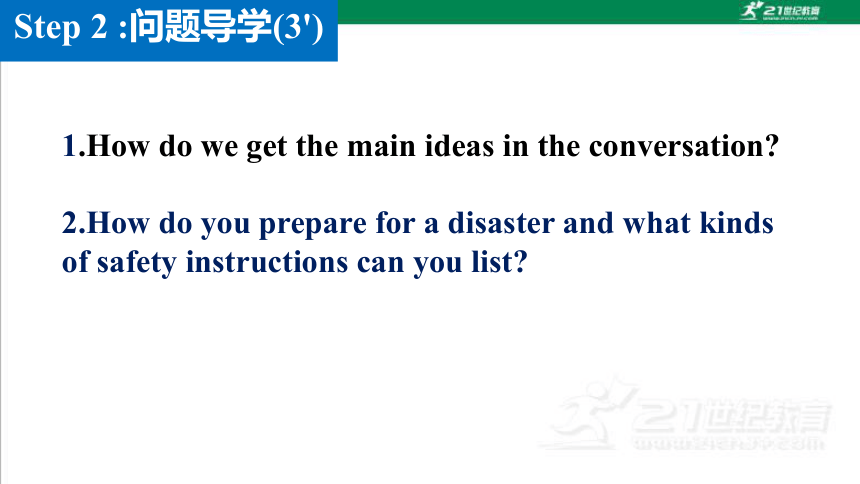
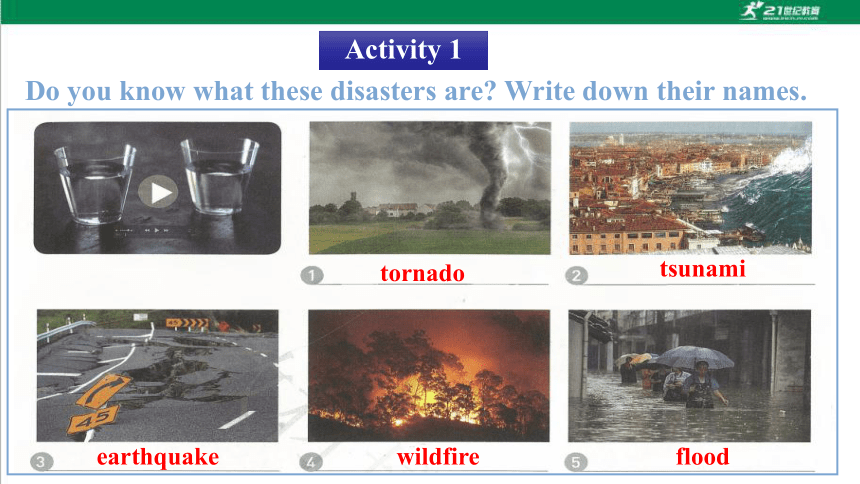
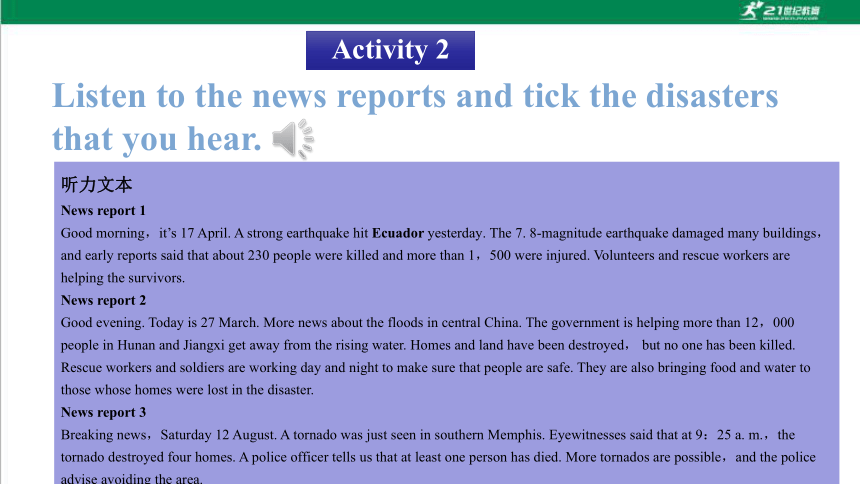
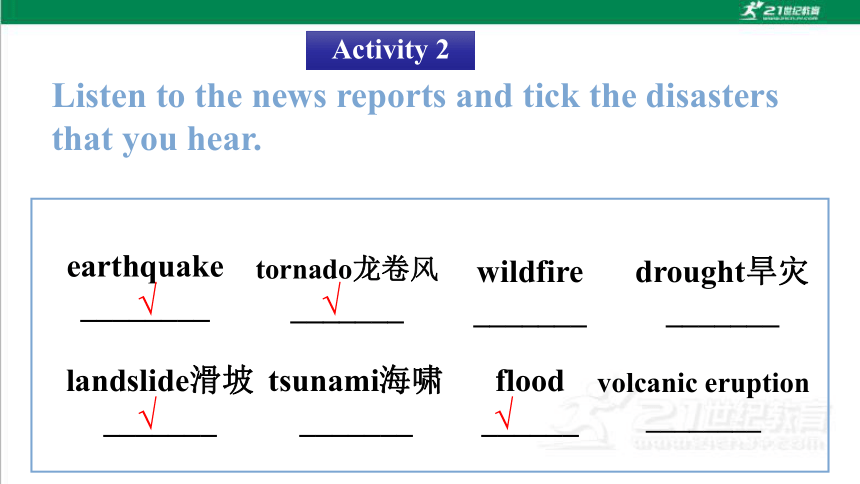
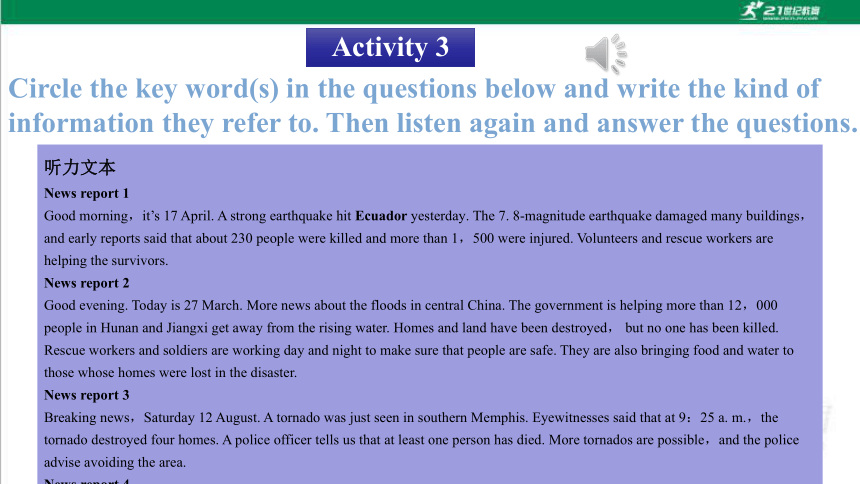
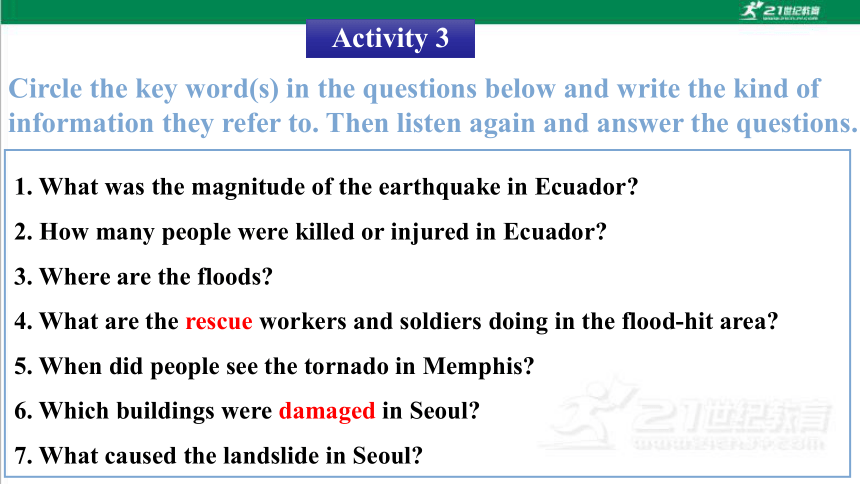
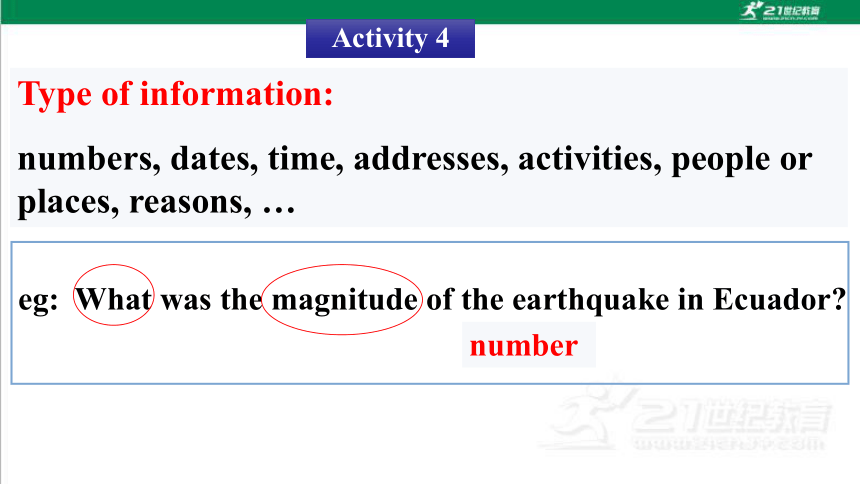
文档简介
(共24张PPT)
UNIT 4 NATURAL DISASTERS
Listening and Speaking
Step1:学习目标(1’)
1.Improve listening and get more information about natural disasters.
2.Learn some words and expressions.
3.To develop a positive attitude in the face of natural disasters and discuss disaster safety measures.
Step 2 :问题导学(3')
1.How do we get the main ideas in the conversation
2.How do you prepare for a disaster and what kinds of safety instructions can you list
tornado
tsunami
earthquake
wildfire
flood
Do you know what these disasters are Write down their names.
Activity 1
Listen to the news reports and tick the disasters that you hear.
Activity 2
tornado龙卷风
_______
earthquake ________
landslide滑坡 _______
tsunami海啸 _______
wildfire
_______
volcanic eruption ________
flood ______
drought旱灾
_______
Listen to the news reports and tick the disasters that you hear.
√
√
√
√
Activity 2
Circle the key word(s) in the questions below and write the kind of information they refer to. Then listen again and answer the questions.
Activity 3
1. What was the magnitude of the earthquake in Ecuador
2. How many people were killed or injured in Ecuador
3. Where are the floods
4. What are the rescue workers and soldiers doing in the flood-hit area
5. When did people see the tornado in Memphis
6. Which buildings were damaged in Seoul
7. What caused the landslide in Seoul
Circle the key word(s) in the questions below and write the kind of information they refer to. Then listen again and answer the questions.
Activity 3
eg: What was the magnitude of the earthquake in Ecuador
Type of information:
numbers, dates, time, addresses, activities, people or places, reasons, …
number
Activity 4
Questions Type of information
1. What was the magnitude of the earthquake in Ecuador
2. How many people were killed or injured in Ecuador
3. Where are the floods
4. What are the rescue workers and soldiers doing in the flood-hit area
5. When did people see the tornado in Memphis
6. Which buildings were damaged in Seoul
7. What caused the landslide in Seoul
number
number
place
activities
time
place
reason
Questions Answers
1. What was the magnitude of the earthquake in Ecuador
2. How many people were killed or injured in Ecuador
3. Where are the floods
4. What are the rescue workers and soldiers doing in the flood-hit area
5. When did people see the tornado in Memphis
6. Which buildings were damaged in Seoul
7. What caused the landslide in Seoul
7.8
About 230 were killed and more than 1,500 were injured.
central China
They are working day and night to make sure that people are safe.
At 9:25 a.m.
a library and a supermarket
by heavy rain that has fallen in the last week
14:28 Monday, 12 May
Magnitude 7.8 (8.0)
At least 8,500 killed (by 13 May)
Rescue workers (medical teams, troops, volunteers, etc.) organised quickly
Began on 1 May
2,400 homes destroyed
Almost 88,000 people evacuated
Hundreds of firefighters arrived
Planes, helicopters used to fight the fire
No deaths, no injuries
Began in May
82 killed, 500,000 affected
Rescue teams provided food and water
Shelters set up by the government
Earthquake
Wenchuan, China
Wildfire
Alberta, Canada
Flood
Colombo, Sri Lanka
Use the information below to practice speaking.
Step 2 :问题导学二(1’) Listening and Talking
How do you prepare for a disaster and what kinds of safety instructions can you list
Mrs Fors is a rescue worker. She and her dog, Lucky, are visiting a senior high school. Listen to the conversation and complete the table below.
Activity 1
Mrs Fors is a rescue worker. She and her dog, Lucky, are visiting a senior high school. Listen to the conversation and complete the table.
Before an earthquake Make a safety list of _________, __________ and _____________.
During an earthquake
(in a building) Remember to “________, ________ and ________”.
what to do
where to go
who to contact
drop
cover
hold on
Step 3 :点拨运用二(10’)
During an earthquake
(outdoors) Go to a(n) ________ space away from ________, ________ or power lines.
After an earthquake
(if you’re trapped) Use a(n) _________ to get help.
Tap on a pipe or _________ or whistle for help.
open
buildings
trees
cell phone
a wall
n.电力;能量;力量
n.&n.轻敲;水龙头
n.管子
v.&n.吹口哨;哨子
First / First of all, you should ...
Cover your ...
Call an emergency number.
Stay calm.
Listen to the news.
Stay away from ...
Don’t drive or walk outside.
Move to a safe place.
Make sure ...
Collect water and food if you can ...
Finally ...
Stay indoors.
Work in pairs. Choose a disaster and prepare a list of safety instructions. The expressions below may help you.
Activity 2
Possible answer:
First of all, you should stay calm if you’re in a tornado. Cover your ears if the noise is too loud. Stay indoors and get to a low place. Stay away from windows. Don’t drive or walk outside in a tornado.
Activity 2
1.Listening skills: How to listen for details.
2.Knowledge about natural disasters.
Step 4 :课堂小结(2’)
Having an emergency kit prepared is also very important. Look at the emergency supplies below. Discuss with a partner what else you would add.
Activity 3
Step 5:当堂检测(12')
Good morning. Today is 13 May. A huge earthquake hit Wenchuan, China yesterday afternoon ...
Example
Good morning. Today is 13 May. A huge earthquake hit Wenchuan, China yesterday. It has killed at least 8,500 people by now. The earthquake measured 7.8 on the Richter scale. Injured survivors have been moved to safety by rescue workers, including medical workers, troops, and volunteers, who organised quickly.
Pronunciation
1 Listen and repeat. Pay attention to the letters in bold.
·pipe brick ·tend death
·keen glory ·fond view
·think they ·campus amaze
·flash garage ·French bridge
·truly draw ·events friends
2 Read the words aloud. Pay attention to the pronunciation of the -ed endings. Then write the words in the boxes.
begged breathed described concentrated confused debated exchanged helped laughed learned depended embarrassed pretended reserved shocked viewed watched wished
/t/ /d/ / d/
/t/:helped,laughed,embarrassed,shocked,watched,wished
/d/:begged,breathed,described,confused,exchanged,learned,reserved,viewed
/ d/:concentrated,debated,depended,pretended
UNIT 4 NATURAL DISASTERS
Listening and Speaking
Step1:学习目标(1’)
1.Improve listening and get more information about natural disasters.
2.Learn some words and expressions.
3.To develop a positive attitude in the face of natural disasters and discuss disaster safety measures.
Step 2 :问题导学(3')
1.How do we get the main ideas in the conversation
2.How do you prepare for a disaster and what kinds of safety instructions can you list
tornado
tsunami
earthquake
wildfire
flood
Do you know what these disasters are Write down their names.
Activity 1
Listen to the news reports and tick the disasters that you hear.
Activity 2
tornado龙卷风
_______
earthquake ________
landslide滑坡 _______
tsunami海啸 _______
wildfire
_______
volcanic eruption ________
flood ______
drought旱灾
_______
Listen to the news reports and tick the disasters that you hear.
√
√
√
√
Activity 2
Circle the key word(s) in the questions below and write the kind of information they refer to. Then listen again and answer the questions.
Activity 3
1. What was the magnitude of the earthquake in Ecuador
2. How many people were killed or injured in Ecuador
3. Where are the floods
4. What are the rescue workers and soldiers doing in the flood-hit area
5. When did people see the tornado in Memphis
6. Which buildings were damaged in Seoul
7. What caused the landslide in Seoul
Circle the key word(s) in the questions below and write the kind of information they refer to. Then listen again and answer the questions.
Activity 3
eg: What was the magnitude of the earthquake in Ecuador
Type of information:
numbers, dates, time, addresses, activities, people or places, reasons, …
number
Activity 4
Questions Type of information
1. What was the magnitude of the earthquake in Ecuador
2. How many people were killed or injured in Ecuador
3. Where are the floods
4. What are the rescue workers and soldiers doing in the flood-hit area
5. When did people see the tornado in Memphis
6. Which buildings were damaged in Seoul
7. What caused the landslide in Seoul
number
number
place
activities
time
place
reason
Questions Answers
1. What was the magnitude of the earthquake in Ecuador
2. How many people were killed or injured in Ecuador
3. Where are the floods
4. What are the rescue workers and soldiers doing in the flood-hit area
5. When did people see the tornado in Memphis
6. Which buildings were damaged in Seoul
7. What caused the landslide in Seoul
7.8
About 230 were killed and more than 1,500 were injured.
central China
They are working day and night to make sure that people are safe.
At 9:25 a.m.
a library and a supermarket
by heavy rain that has fallen in the last week
14:28 Monday, 12 May
Magnitude 7.8 (8.0)
At least 8,500 killed (by 13 May)
Rescue workers (medical teams, troops, volunteers, etc.) organised quickly
Began on 1 May
2,400 homes destroyed
Almost 88,000 people evacuated
Hundreds of firefighters arrived
Planes, helicopters used to fight the fire
No deaths, no injuries
Began in May
82 killed, 500,000 affected
Rescue teams provided food and water
Shelters set up by the government
Earthquake
Wenchuan, China
Wildfire
Alberta, Canada
Flood
Colombo, Sri Lanka
Use the information below to practice speaking.
Step 2 :问题导学二(1’) Listening and Talking
How do you prepare for a disaster and what kinds of safety instructions can you list
Mrs Fors is a rescue worker. She and her dog, Lucky, are visiting a senior high school. Listen to the conversation and complete the table below.
Activity 1
Mrs Fors is a rescue worker. She and her dog, Lucky, are visiting a senior high school. Listen to the conversation and complete the table.
Before an earthquake Make a safety list of _________, __________ and _____________.
During an earthquake
(in a building) Remember to “________, ________ and ________”.
what to do
where to go
who to contact
drop
cover
hold on
Step 3 :点拨运用二(10’)
During an earthquake
(outdoors) Go to a(n) ________ space away from ________, ________ or power lines.
After an earthquake
(if you’re trapped) Use a(n) _________ to get help.
Tap on a pipe or _________ or whistle for help.
open
buildings
trees
cell phone
a wall
n.电力;能量;力量
n.&n.轻敲;水龙头
n.管子
v.&n.吹口哨;哨子
First / First of all, you should ...
Cover your ...
Call an emergency number.
Stay calm.
Listen to the news.
Stay away from ...
Don’t drive or walk outside.
Move to a safe place.
Make sure ...
Collect water and food if you can ...
Finally ...
Stay indoors.
Work in pairs. Choose a disaster and prepare a list of safety instructions. The expressions below may help you.
Activity 2
Possible answer:
First of all, you should stay calm if you’re in a tornado. Cover your ears if the noise is too loud. Stay indoors and get to a low place. Stay away from windows. Don’t drive or walk outside in a tornado.
Activity 2
1.Listening skills: How to listen for details.
2.Knowledge about natural disasters.
Step 4 :课堂小结(2’)
Having an emergency kit prepared is also very important. Look at the emergency supplies below. Discuss with a partner what else you would add.
Activity 3
Step 5:当堂检测(12')
Good morning. Today is 13 May. A huge earthquake hit Wenchuan, China yesterday afternoon ...
Example
Good morning. Today is 13 May. A huge earthquake hit Wenchuan, China yesterday. It has killed at least 8,500 people by now. The earthquake measured 7.8 on the Richter scale. Injured survivors have been moved to safety by rescue workers, including medical workers, troops, and volunteers, who organised quickly.
Pronunciation
1 Listen and repeat. Pay attention to the letters in bold.
·pipe brick ·tend death
·keen glory ·fond view
·think they ·campus amaze
·flash garage ·French bridge
·truly draw ·events friends
2 Read the words aloud. Pay attention to the pronunciation of the -ed endings. Then write the words in the boxes.
begged breathed described concentrated confused debated exchanged helped laughed learned depended embarrassed pretended reserved shocked viewed watched wished
/t/ /d/ / d/
/t/:helped,laughed,embarrassed,shocked,watched,wished
/d/:begged,breathed,described,confused,exchanged,learned,reserved,viewed
/ d/:concentrated,debated,depended,pretended
